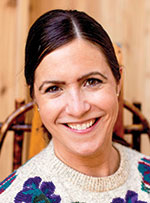Twenty Something / Christina Capecchi
Unsinkable faith: a daughter of the shipwrecked Edmund Fitzgerald
 It was a Monday afternoon in November when Debbie Champeau got the call. The 17-year-old, a senior at St. Pius XI School in Milwaukee, Wis., left school immediately, taking two buses to get home.
It was a Monday afternoon in November when Debbie Champeau got the call. The 17-year-old, a senior at St. Pius XI School in Milwaukee, Wis., left school immediately, taking two buses to get home.
There, she found her mother and grandmother parked by the telephone, distraught. They feared the worst: that Debbie’s father, Buck, had gone down in a shipwreck.
The Edmund Fitzgerald.
That evening, confirmation came—and with it, rain.
Debbie bolted outside and ran three blocks to the rectory, where she frantically rang the doorbell and pounded on the door.
“I was desperate for some kind of consolation,” she said. “Why? How could God do this? I needed answers. I wanted to talk to one of the priests.”
Father Dennis answered, sitting down with the teen and calming her.
“This isn’t for us to question,” the middle-aged priest told her.
“For me, that was so unacceptable as an explanation,” she said.
Being Catholic had been central to Debbie’s life. She’d always attended Catholic school—her dad had insisted on it. She never missed Mass on Sunday. She taught religious education. She sang in the choir. And she worked for the Notre Dame nuns who ran her school. “I loved all the nuns there,” Debbie said. “I was doing what I could to help the Church.”
But her world no longer made sense. Beneath the sorrow burned a raw anger at God.
Debbie stopped going to Mass.
She still talked to God, but she couldn’t reconcile her loss with her faith. A loving God. A brutal storm. Her father, at the very worst spot at the very worst time.
Closure was hard to come by. No body, no casket. Just an empty grave.
Debbie had a recurring nightmare of seeing her dad’s hand stretching out of Lake Superior and trying to clutch it, but not reaching it in time.
A year later, Debbie found her way back to church.
“Finally, I just accepted it,” she said. “I came to peace with everything, and my faith made me stronger instead of pushing me away in anger. We give it up to God because there’s nothing we can do to bring him back.”
Now 67 and a widowed grandmother, Debbie’s Catholic faith has become an anchor to her father, who always cherished his Catholic faith.
“It connects us,” said Debbie, who is a member of St. Charles Parish in Hartland, Wis. “There are times I feel his presence—especially when I go to church and I’m praying. I say a prayer that he’s at peace in heaven and joined with my mom and all his friends and now Gordon Lightfoot playing his guitar.”
Sometimes she imagines her dad’s final moments as the ship broke in half, engulfed by 50-foot waves. She assumes he was praying Hail Mary’s.
“I think he really dug into his faith because that’s your stronghold during those times,” Debbie said.
This month marks the 50th anniversary of the Edmund Fitzgerald’s sinking. Debbie will gather with other family members of the 29-member crew at Whitefish Bay to ring the bell rescued from the ship.
Their stories are chronicled in a fascinating new book by John U. Bacon called The Gales of November: The Untold Story of the Edmund Fitzgerald.
With exhaustive research and reporting, Bacon’s undertaking was inherently Catholic: to dignify each crew member, to demonstrate that they had mattered, that they still matter. The book illuminates “the faces and names of the wives and the sons and the daughters,” as Lightfoot famously sang.
For Debbie, it’s another way to honor her dad. “I’ve tried very hard to keep his memory alive and make him proud.”
(Christina Capecchi is a freelance writer from Grey Cloud Island, Minn.) †
 It was a Monday afternoon in November when Debbie Champeau got the call. The 17-year-old, a senior at St. Pius XI School in Milwaukee, Wis., left school immediately, taking two buses to get home.
It was a Monday afternoon in November when Debbie Champeau got the call. The 17-year-old, a senior at St. Pius XI School in Milwaukee, Wis., left school immediately, taking two buses to get home.